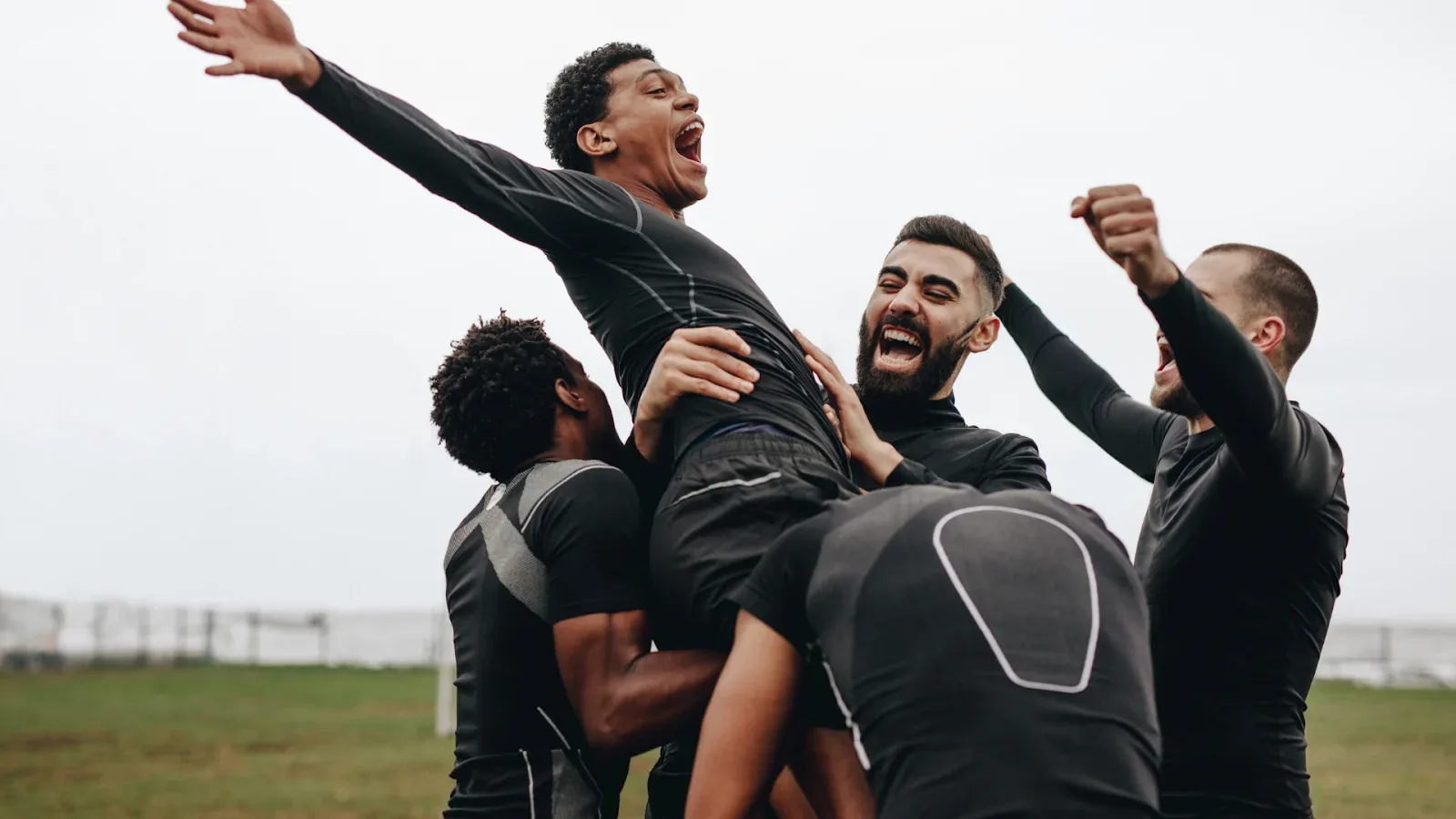
Social needs, or better yet, unmet social needs might be what’s holding you back!
Ever wondered why, despite all your training, you still might not seem to progress as expected?
Let’s dive into a topic not many talk about but could be your game-changer: social needs.
What are social needs?
Think of social needs as your craving for connection.
It’s about feeling part of a group, having friends, and getting support.
It’s like the fuel for your mental and emotional engine.
Social needs go beyond just hanging out.
They’re about feeling seen and valued!
It’s knowing that you matter to someone else, and they matter to you.
Ever felt a rush after a good chat with a friend?
That’s your social need tank getting filled up.
They also involve giving and receiving attention.
It’s a two-way street.
You’re not just there to get support. You’re there to give it, too.
This exchange builds trust and a sense of belonging.
Another aspect?
Shared experiences!
Going through things together, be it a tough workout or a victory lap, creates bonds that are hard to break.
These experiences tell us we’re not alone in our journey.
Lastly, let’s talk about recognition.
Everyone likes a pat on the back, right?
Recognition from our peers boosts our self-esteem and motivates us. It’s a powerful reminder that we’re doing something right.
So, when we talk about social needs, we’re talking about a complex mix of belonging, support, shared experiences, and recognition.
Fulfilling these needs can be the secret sauce to not just surviving, but thriving, both on and off the field.
Why do we need to fulfill our social needs?
Here’s the scoop: humans are social creatures.
When our need for connection is met, our stress levels drop!
This means better focus, more energy, and, yup, improved performance.
It’s not just about being happier. It’s about being more effective, too.
Digging deeper into why fulfilling our social needs is crucial, let’s think about the less obvious reasons that don’t always get the spotlight.
Fulfilling our social needs does wonders for our mental health.
It’s like mental health hygiene.
Just as you brush your teeth to prevent cavities, connecting with others can prevent feelings of loneliness and depression.
Ever felt a mood lift after a coffee with a friend?
That’s your brain thanking you for the social snack.
Here’s a surprise: meeting our social needs can actually make us physically healthier.
Studies show that people with strong social bonds have lower risks of diseases like heart disease.
Why?
Stress reduction plays a big part.
Less stress equals a happier heart.
Interacting with others, especially those who challenge us, sparks personal growth.
Ever learned something new about yourself through a friend’s eyes?
That’s growth.
These interactions push us out of our comfort zones, making us more adaptable and resilient.
Fulfilling our social needs helps us develop empathy.
When we connect with others, we learn to see the world from their perspectives.
This empathy makes us better teammates, friends, and humans.
It’s like upgrading your emotional intelligence.
The more we engage with others, the better we get at communicating.
Whether it’s learning to listen more effectively or expressing ourselves more clearly, fulfilling our social needs gives us the practice we need to enhance these vital skills.
At the end of the day, fulfilling our social needs is essential for our overall well-being.
It’s not just about feeling good in the moment. It’s about building a foundation for a healthy, happy, and successful life.
Whether you’re an athlete pushing for peak performance or anyone aiming for a balanced life, ignoring your social needs is like trying to run a marathon with one shoe.
It’s possible, but why make it harder than it has to be?

How can we fulfill our social needs?
It’s not rocket science.
Start with small talk with teammates.
Join a club.
Be part of a community.
The goal?
Create bonds that make you feel supported and understood.
Expanding on how we can fulfill our social needs, let’s explore some creative and meaningful ways to deepen our connections and enrich our social lives.
Get involved in community service
Volunteering for causes you care about connects you with like-minded individuals.
It’s a double win: you make a difference and meet people who share your passions.
This shared purpose can forge deep bonds.
Join online forums or groups with similar interests
In the digital age, communities aren’t just local.
Joining online forums or groups related to your interests or challenges can provide a sense of belonging and understanding, especially in niche areas.
Participate in team sports or group activities
Even if you’re not an athlete, engaging in team sports or group activities can satisfy your social needs.
It’s about collaboration and shared experiences, creating a natural bonding environment.
Schedule regular check-ins with friends or family
In our busy lives, we often forget to catch up.
Scheduling regular check-ins, be they calls or meet-ups, ensures you stay connected with your loved ones, keeping the lines of communication open.
Attend workshops or classes
Learning something new in a group setting not only feeds your brain but also your social needs.
The shared challenge of mastering a new skill can quickly bring people together.
Practice active listening and empathy
Fulfilling social needs isn’t just about being around people. It’s about quality interactions.
Practicing active listening and showing empathy can deepen your connections, making others feel heard and valued.
Open up and be vulnerable
Sharing personal stories or challenges can seem daunting, but it’s a powerful way to connect.
Vulnerability invites trust and deepens relationships, showing others it’s safe to open up in return.
Celebrate others’ successes
Being a cheerleader for others’ achievements creates a positive environment and strengthens bonds.
It shows you’re supportive, not just there for the tough times but for the good times too.
Create or join a support group
Sometimes, we need support from those who’ve been in our shoes.
Creating or joining a support group can provide a space for sharing experiences and strategies for overcoming similar challenges.
Foster a pet
While human connections are vital, the companionship of a pet can also fulfill some social needs.
The unconditional love and bond with a pet can provide comfort and reduce feelings of loneliness.
Incorporating these strategies into your life can significantly enhance your social fulfillment, contributing to a more balanced and satisfying life.
Remember, fulfilling your social needs is a journey, not a destination.
It’s about making small, consistent efforts to connect and engage with the world around you.
The power of a “we” mindset
When I’m talking about a ‘we’ mindset I mean ‘we’ as in team, community, group and below I will expand on the importance of being part of a team, or community… or even a group.
You see, embracing a “we” over a “me” mindset can be a game-changer.
Feeling part of a team makes challenges seem smaller and goals more attainable.
Plus, celebrating wins together?
It’s the best feeling!
When a team adopts a “we” mindset, it’s like aligning multiple compasses to point in the same direction.
It creates a shared vision that guides actions and decisions.
This unity makes the journey towards goals a cohesive effort rather than a disjointed one.
A “we” mindset forges a strong team identity.
It’s like wearing a team jersey invisible to the eye but felt in the heart.
This sense of identity fosters loyalty, dedication, and a deep-seated commitment to not let each other down.
The collective energy of a “we” mindset can significantly amplify individual motivation.
Knowing you’re part of something bigger makes personal sacrifices more meaningful.
It’s the difference between pushing through the last mile for yourself and doing it for the team.
Teams grounded in a “we” mindset navigate setbacks and challenges with greater resilience.
The shared belief in overcoming together acts as a buffer against despair. It’s about getting back up because you know the team is counting on you and you on them.
A “we” mindset opens the lines of communication.
It encourages transparency and honesty, creating an environment where feedback is shared constructively, and challenges are addressed collectively.
This openness is crucial for growth and improvement.
Adopting a “we” mindset cultivates selflessness.
It shifts the focus from individual accolades to team success.
Players are more likely to pass the ball for a better shot, knowing that the team’s victory is the ultimate goal.
Lastly, a “we” mindset creates a culture where everyone feels supported.
It’s about celebrating each other’s successes as if they were your own and offering a shoulder to lean on during tough times.
This supportive environment not only boosts performance but also enriches the team’s bond.
The “we” mindset is not just a sports strategy.
It’s a life strategy!
It teaches lessons in unity, sacrifice, and collective resilience that transcend the playing field.
In a world that often emphasizes individual success, the “we” mindset reminds us of the profound impact we can make when we come together with a common purpose.

Examples of how meeting our social needs helps us progress and achieve our goals
Ever noticed how teams that are tight-knit often outperform others?
That’s no coincidence.
When athletes feel connected, they push harder, go longer, and bounce back faster.
It’s about knowing someone has your back!
Let’s dive into some real-life examples that illustrate how fulfilling social needs can propel us towards our goals and make the journey more rewarding.
The Comeback Story
Consider an athlete recovering from an injury.
They’re not just fighting physical limitations but also battling isolation and discouragement.
When teammates and coaches regularly check in, offer encouragement, or simply share a coffee, it fuels the athlete’s motivation.
This sense of belonging accelerates recovery, turning a potentially solitary struggle into a team triumph.
The Rookie Phenomenon
Imagine a rookie joining a seasoned team.
The integration into the team’s social fabric can make or break their initial experience.
When the team goes out of its way to include the rookie in social gatherings, group chats, and team rituals, it boosts the newcomer’s confidence and sense of belonging.
This camaraderie translates to better performance on the field as the rookie feels supported and valued, not just as an athlete but as a person.
The Underdog Victory
There’s something magical about an underdog team that beats the odds.
These victories often stem from a deep-seated belief in each other and the strength of their collective bond.
When every member of the team feels seen, heard, and integral to the team’s mission, they’re more likely to put in that extra effort, believe in the impossible, and support each other through thick and thin.
The victory, in this case, is a direct result of the team’s cohesive spirit and mutual support.
The Personal Best Breakthrough
Athletes often talk about the moment they broke through a personal barrier, achieving a new personal best.
Behind many of these moments are teammates and coaches who’ve provided relentless support, pushed for one more try, and celebrated small victories along the way.
This network of encouragement and belief creates an environment where athletes are more willing to take risks and push beyond their perceived limits.
The Leadership Evolution
Leadership isn’t just about guiding others.
It’s about growing with them.
A captain or coach who prioritizes fulfilling the social needs of their team fosters a culture of mutual respect and understanding.
This approach not only strengthens the team’s dynamics but also enhances the leader’s ability to motivate and inspire.
It’s a testament to how meeting social needs can elevate not just individual performance but the collective prowess of the team.
These examples showcase that fulfilling our social needs isn’t just a nice-to-have.
It’s a critical component of achieving excellence!
Whether it’s coming back from injury, integrating new members, overcoming odds, breaking personal records, or evolving as a leader, the foundation of social support is key.
It’s the glue that binds individual efforts into collective achievements, transforming goals into realities.
The role of vulnerability
Here’s something few talk about: being vulnerable.
Sharing doubts or fears doesn’t make you weak.
It builds stronger connections!
And strong connections lead to stronger performances!
When you show vulnerability, you’re signaling to others that it’s safe to be themselves around you.
This authenticity fosters deeper, more genuine connections.
Imagine a team where everyone feels comfortable sharing their fears and insecurities.
This level of honesty creates a support system that’s not just about physical performance but emotional well-being too.
Vulnerability acts as a catalyst for team cohesion.
When a leader or teammate admits to a mistake or shares personal challenges, it humanizes them.
Others see that it’s okay not to be perfect.
This openness can transform the team dynamic, encouraging everyone to work together more empathetically and supportively.
You see, trust is the cornerstone of any successful team, and vulnerability is key to building it!
When individuals are open about their limitations and seek help, it creates a culture of trust.
Team members begin to rely on each other not just for their strengths but also as partners in overcoming weaknesses.
Admitting you don’t have all the answers is a form of vulnerability that can lead to collective growth.
It opens the door for others to contribute, share knowledge, and propose solutions.
This environment encourages learning and adaptation, essential components for individual and team development.
Often, the biggest barriers to peak performance are mental and emotional.
Vulnerability helps in acknowledging these barriers, whether they’re fears, pressures, or stresses.
Bringing these to light allows for strategies to be developed collaboratively, ensuring that athletes are not only physically prepared but also mentally and emotionally supported.
Vulnerability leads to a culture where asking for help is seen as a strength, not a weakness.
This culture supports mental health, reduces burnout, and ensures that individuals feel valued and understood.
When people know their team has their back, they’re more likely to take the necessary risks to improve and succeed.
When leaders show vulnerability, it sets a powerful example for the entire team.
It shows that leadership is not about being invincible but about being relatable and approachable.
This can inspire others to lead in their own ways, fostering a team of leaders rather than followers.
The role of vulnerability in sports (and in life) cannot be overstated.
It’s the secret ingredient for building stronger, more cohesive teams capable of overcoming any challenge.
By embracing our vulnerabilities, we not only enhance our performance but also enrich our human experience, making the journey towards our goals as rewarding as the achievements themselves.

Digital connections: A double-edged sword
In today’s world, it’s easy to think a text or a like equals connection.
But real, deep connections?
They’re built face-to-face, in the sweat, tears, and laughter of real life!
Delving deeper into the nuanced world of digital connections, it’s essential to recognize their benefits and pitfalls, especially in how they influence our social needs and overall well-being.
Digital platforms allow us to connect with teammates, friends, and family instantly, regardless of physical distances.
This immediacy can be a lifeline, especially for those who might feel isolated otherwise.
However, this constant connectivity often comes at the cost of genuine, deep connections.
The convenience of a text can sometimes replace the warmth of a voice call or the meaningfulness of face-to-face interactions.
Social media gives us a window into the lives of others, offering a sense of being connected without the depth of real interactions.
This illusion of inclusion can lead to feelings of loneliness and inadequacy, as we compare our behind-the-scenes to everyone else’s highlight reels.
For athletes, this can translate into unnecessary pressure and a distorted sense of competition even off the field.
Digital platforms are powerful tools for sharing successes, insights, and motivations.
They give athletes and teams a voice and a way to inspire and engage with a broader audience.
However, the nuance of personal interaction is often lost.
The support that comes from a thoughtful pause, an understanding nod, or a timely hug cannot be replicated by likes or comments.
The emotional depth and the subtleties of face-to-face communication are crucial for fulfilling our social needs in a way digital interactions simply cannot.
Online communities can offer a sense of belonging to those with niche interests or those who feel marginalized in their immediate physical environments.
For athletes, digital platforms can be spaces to find peers who share the same challenges and ambitions.
Yet, these virtual communities can also encourage echo chambers, where diverse opinions are drowned out, leading to a narrowed perspective on the world and oneself.
Digital connections are a double-edged sword in our quest to fulfill our social needs.
They offer unprecedented opportunities for staying connected, yet challenge the authenticity and depth of our relationships.
Recognizing and navigating this balance is essential for individuals and teams aiming to harness the power of connections in achieving their highest potential.
Your action plan
- Start simple
Reach out to a teammate.
Share something personal after practice.
Join a group activity.
Watch how these small steps can lead to big leaps in your performance.
- Prioritize Quality Time
Carve out time in your schedule for quality interactions with friends, family, and teammates.
This means being fully present during these moments, without distractions from devices or thoughts about your to-do list.
Whether it’s a coffee catch-up, a shared workout, or simply a walk in the park, make these moments count.
- Engage in Team-Building Activities
Participate in or organize team-building activities that are not solely focused on performance.
Activities that challenge you in different ways, like escape rooms, team dinners, or volunteer work, can strengthen bonds and create shared memories outside of the usual context.
- Share Personal Stories
Open up about your personal experiences, challenges, and victories.
Sharing stories is a powerful way to connect on a deeper level.
It invites others to see the real you and often encourages them to open up in return, creating a cycle of trust and mutual support.
- Offer and Seek Support
Be proactive in offering support to others, and don’t hesitate to seek it out when you need it.
This can be as simple as asking a teammate how they’re doing, offering encouragement before a big event, or reaching out for advice or a listening ear.
- Establish Digital Boundaries
While digital connections have their place, establishing boundaries around their use can help prioritize face-to-face interactions.
Set specific times to disconnect from devices and be present with those around you.
Use digital platforms to enhance your relationships, not replace them.
- Practice Active Listening
When engaging with others, practice active listening.
This means fully focusing on the speaker, understanding their message, and responding thoughtfully.
Active listening demonstrates your respect and interest in the relationship, deepening the connection.
- Foster a Culture of Inclusivity
Whether in a team environment or among friends, work to create an atmosphere where everyone feels valued and included.
Celebrate diversity and encourage the sharing of different perspectives.
Inclusivity strengthens the social fabric of any group, enriching everyone’s experience.
- Reflect and Adjust
Regularly take time to reflect on your social interactions and relationships.
Consider what’s working well and what might need adjusting.
Being mindful of your social needs and how they’re being met allows you to make necessary changes to maintain balance and fulfillment.
By following these steps, you’re not just fulfilling your social needs. You’re building a foundation for lasting, meaningful connections that can significantly impact your well-being and performance.
Remember, the strength of your relationships often mirrors the strength of your character and achievements.
It’s about creating a life rich in connections that support, challenge, and celebrate you every step of the way.
Conclusion
Meeting your social needs might just be the missing piece in your high-performance puzzle.
It’s about more than just skills and drills. It’s about building the connections that fuel your fire.
So, go on, get connected, and watch how high you can really soar.
It’s about building a tribe that gets you, supports you, and cheers for you. Think of it as teaming up for success, both on and off the field.
And hey, if you’re looking for your tribe, the Success Stories Community is where it’s at.
As your sports psychologist, I’m here to guide you.
You’ll find folks who are on the same journey.
Plus, loads of resources to help you hit those high notes in performance.
So, don’t let going solo slow you down.
Jump into a community that uplifts you.
Together, we’ll tackle those goals, celebrate the wins, and maybe share a few laughs along the way.
Let’s make those success stories happen, one connection at a time!



